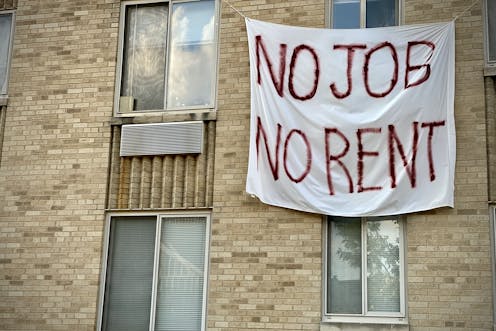Raising the minimum wage is a health issue, too
It's not just about the money. Raising the minimum wage would lead to happier and healthier lives for millions of Americans.

Congress just missed one of its best shots at improving health when the Senate failed to advance a bill that would have raised the minimum wage to US$15 an hour. Study after study has linked higher income to better health.
Consider that a well-paying job, by definition, increases household income. That, in turn, means increased access to good nutrition, heat and a safe environment. It also means adequate health care. With that job, you’ll likely make more visits to primary care doctors, dentists and specialists who work in preventive care.
An inadequate income does none of these things. Instead, it increases susceptibility to psychological stress, malaise, illness and disease. This is one reason those who move off welfare benefits and gain employment improve their well-being.
I am not an economist. But I am a physician and public health scientist. I can tell you that research shows that a well-paying job translates to a longer life. For example, researchers in 2016 found that the richest 1% of men in the U.S. lived 14.6 years longer on average than the poorest 1% of men.

Employment benefits
Numerous studies show employment is linked to self-esteem, purpose and identity. It provides relationships, social connections, social status and regular productive activity; a job is an integral part of a person’s identity. Its loss threatens that identity, which is why unemployment typically causes a decline in mental health. When compared with their employed counterparts, unemployed Americans are far more likely to receive a diagnosis of depression.
One study found that people with a disability who were employed were less likely to have frequent mental distress, including anxiety and depression, than those with a disability who were not employed (18% vs. 40%). This finding held up even when accounting for demographics and individual characteristics.
A possible solution
Many economists have long criticized unemployment benefits because of their negative impact on the willingness to work. The average unemployment benefit is $320 weekly; the amount varies by state. The American Rescue Plan, recently passed to provide economic aid to million of Americans hit hard by the pandemic, adds an additional $300 to unemployment benefits through Sept. 6.
Compare that to the current federal minimum wage: $7.25 an hour. That’s $290 for a 40-hour week, less than what unemployment benefits pay. That means, for millions of Americans, being employed means less income. With the federal supplement, 63% of workers currently make more on unemployment than they would with a minimum-wage job. Reduce the federal supplement to only $100 a week, and 25% of the workforce would still make more on unemployment.
Which raises the question: Why not increase the minimum wage – at least enough to make it more than unemployment benefits? That way, more people would be motivated to seek jobs.
That may not happen soon, if at all. President Biden’s plan to raise the federal minimum wage to $15 per hour was not a part of the $1.9 trillion COVID-19 aid package. And it’s true there’s a downside: Raising the minimum wage can reduce the number of jobs available. A Congressional Budget Office estimate on Biden’s proposal says the raise would lift 900,000 people out of poverty, but it would also kill 1.4 million jobs over four years.
That said, people who are fit to work should be encouraged to seek, not shun, employment. With unemployment benefits more than the basic minimum wage in many states, we are sending the wrong message to millions. There’s more to a higher minimum wage than just more money. It also means more happiness, better health and a longer life.
[Get the best of The Conversation, every weekend. Sign up for our weekly newsletter.]
Utibe Effiong does not work for, consult, own shares in or receive funding from any company or organisation that would benefit from this article, and has disclosed no relevant affiliations beyond their academic appointment.
Read These Next
The intensity and perfectionism that drive Olympic athletes also put them at high risk for eating di
Athletes in sports where weight and body image come into play, such as figure skating and wrestling,…
OpenAI has deleted the word ‘safely’ from its mission – and its new structure is a test for whether
OpenAI’s restructuring may serve as a test case for how society oversees the work of organizations…
Colorectal cancer is increasing among young people, James Van Der Beek’s death reminds – cancer exp
Colon cancer symptoms can be subtle. While lifestyle changes can help reduce your risk, open communication…





